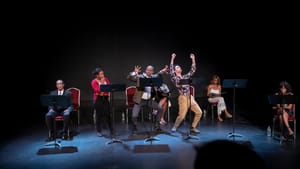Stay in the Loop
BSR publishes on a weekly schedule, with an email newsletter every Wednesday and Thursday morning. There’s no paywall, and subscribing is always free.
The 2025 New Play Development Conference goes local
PlayPenn’s 20th anniversary conference takes root in Philly neighborhoods

PlayPenn’s New Play Development Conference, now celebrating its 20th year, recently lost critical NEA funding. But the conference is still on, with three resident playwrights instead of the planned four, and readings featuring four other emerging writers. This year’s conference runs from July 5 through 20, with a variety of free events throughout the city.
Throughout its history, PlayPenn has developed 160 plays with more than 600 productions, including Oslo by J.T. Rogers, which was workshopped at PlayPenn in 2015, opened on Broadway in 2017, and captured a slew of awards, including a Tony for Best Play. James Ijames honed his skills at PlayPenn before writing the Pulitzer Prize-winning Fat Ham.
This year’s events include staged readings of plays by the three playwrights in residence and the winners of the Young Playwrights and Foundry development programs, as well as conversations about these works-in-progress. Other sessions are designed to help beginning playwrights get a start in the business. This year, PlayPenn embraces the city’s neighborhoods, inviting in new audiences and allowing the plays to be heard in their own cultural voices, marking a shift in the theater landscape.
Restoring trust
In 2020, the pandemic pause gave arts institutions both an existential shock and time for reflection. At PlayPenn, long-simmering complaints of racism and sexual harassment by a donor exploded onto Facebook, and then the press. Founder and director Paul Meshejian resigned, and the call went out for a new director to heal the wounds of the past. For all its successes, PlayPenn isn’t really known in Los Angeles, but Che’Rae Adams, founder of the LA Writers’ Center, was looking for a challenge. “I was intrigued,” she said. She’d had plenty of experience working with playwrights, so she answered the ad.
Restoring trust in the middle of a worldwide pandemic sounds like an insurmountable task, but Adams had a plan: return to the source. “I listened to people for about a year. And I sat with them—donors, artists, other artistic directors, the community—so I could understand.” Out of those conversations came a new focus. “Usually, it is a national conference and they bring the actors and directors and the dramaturgs in,” Adams said, but the new PlayPenn would rely on local talent: even the playwrights would come from Philadelphia. Working with local talent allowed her to immerse herself in the city’s culture, especially its theater culture.

Adams still had to regain the trust of communities that had suffered the organization’s racism in the past. “One of the decisions I made early on was that the best way for us to gain the trust back is to treat people the way they deserve to be treated. Ultimately, it’s your actions and how you operate day to day.” Part of that was to expand the staff with more diverse faces and lived experiences. Another way was to open up the preliminary review of applicant plays to ethnically compatible readers. Plays are submitted anonymously, but the application asks for demographic information. Then the play is assigned a reader with the cultural context to evaluate it based on what the playwright is trying to do.
A Philly-centric conference
This year’s conference opened to playwrights in the Mid-Atlantic region, but Adams was determined to keep the focus on the city. “Let’s go out to communities, instead of expecting them to come to us, which isn’t always realistic,” she said. Plays that appeal to diverse audiences are a start, but the spaces are often intimidating. Adams looked for theaters across the city that would partner with a resident playwright. West Philly’s Theater in the X will host Harlem Canary/Tokyo Crow by Andrew Saito, Wilma Theater will host Hand Foot Hand by LM Feldman, and in North Philadelphia, Power Street will host Ama. Egg. Oyá. by Lori Felipe-Barkin.
Each playwright will have a local dramaturg, director, cast, and relevant technical assistance funded by PlayPenn, and the first staged reading will occur in their theater’s home community. The conference ends with a second stage reading at PlayPenn’s home at the Drake. In between, there will be events in the communities, so that audiences and playwrights can enter into the readings with a deeper understanding of the text. To get a sense of how that would work, I chatted with playwright Felipe-Barkin and Power Street’s artistic director, Erlina Ortiz.
Ama. Egg. Oyá.
Ama. Egg. Oyá. blends modern-day Miami with Yoruba religion. “It’s this woman’s infertility journey broken up into fables,” Felipe-Barkin told me. “The practice that it’s invoking and playing inside of is called the Patakín, which tells the stories of the gods. There’s Ochun, and she’s very fertile. She can pop out children no problem, but she gives them to YemaYa to raise because she doesn’t want to raise kids. YemaYa is sort of this mother to everybody, and she’s very nurturing, but she can also be very fierce.” The third goddess, Oyah, has had nine stillbirths in the Yoruba cosmology. “She never becomes a biological mother,” Felipe-Barkin said, “and she has this fearsome scream. She’s a warrior goddess, so the scream is tied to war, but it’s like, isn’t the scream also tied to grief?”
Power Street Theatre, located in Kensington, was a perfect match. It serves a diverse immigrant and Latine population with a number of activities around the area and generally produces one of co-artistic director Ortiz’s plays each year. They wanted to produce more playwrights, but money was always an issue. She remembers that when PlayPenn reached out to them, “I made it pretty clear that it was not something that we had budgeted or were granted for,” but with PlayPenn picking up the tab, they were in.

For Ortiz, the conference presented a serendipitous meeting of old friends. Felipe-Barkin spent two years as Power Street’s community outreach coordinator, and they have remained friends, but the match wasn’t planned. When PlayPenn sent her the top three plays, Ortiz said, she realized that she’d already read one of them. Months before, she’d asked Felipe-Barkin to send her the play. “I want to read it,” she said. “I loved it, and then it just so happened that the play that came across my desk was hers.”
Fittingly, the staged reading will be held at Esperanza Health Center’s CORE Center, with a community story circle preceding the show. “We are going to have a conversation around motherhood,” Felipe-Barken said, “the things people are afraid to say, or the truths they are afraid to share. It is a way of connecting what is real and immediate into the community with the art. To be honest, that’s kind of what I am most excited about.”
Visit PlayPenn online to view the full lineup of readings and events and reserve free tickets.
What, When, Where
PlayPenn New Development Conference, July 5-20, 2025. Free. Various locations including the Proscenium Theatre at the Drake, 302 S Hicks Street, Philadelphia. (215) 242-2815 or playpenn.org.
Accessibility
Venues for PlayPenn readings are wheelchair-accessible. Please check with the host venues for other events.
Sign up for our newsletter
All of the week's new articles, all in one place. Sign up for the free weekly BSR newsletters, and don't miss a conversation.

 Camille Bacon-Smith
Camille Bacon-Smith